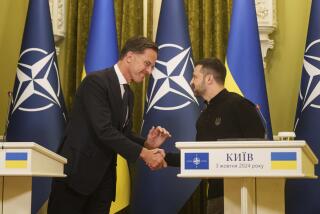Putin Pledges Aid, Troops on Chechnya Trip
GROZNY, Chechnya — With his plan for long-term stability in the troubled republic of Chechnya now in doubt, Russian President Vladimir V. Putin paid a rare visit to this capital Tuesday, pledging a significant boost in police power after the assassination of President Akhmad Kadyrov.
Putin, who has seldom traveled to the breakaway region since the latest war erupted in 1999, stopped at a military barracks and at a hospital where the commander of Russian forces in the region, Lt. Gen. Valery Baranov, lay wounded from the same explosion that killed Kadyrov on Sunday.
The bomb that exploded in a VIP seating area during a public celebration commemorating the Nazi defeat in World War II killed at least seven people, including the former head of the Chechen state council. More than 50 others were injured.
Putin’s flight over the devastated Chechen capital gave him an opportunity to see firsthand the destruction wrought by Russian tanks, bombs and artillery during the fighting of the last decade. Even after millions of dollars in reconstruction aid, the city is an eerie landscape of ruins, block after block of crumbling buildings standing as sentinels as far as the eye can see.
“Despite the fact that some things are being done there, I have to tell you that it looked horrible from a helicopter,” Putin said later.
He ordered his Cabinet to give priority to ensuring payment of millions of dollars in compensation to Chechens, for whom a home-rebuilding program has been mired for more than a year in bureaucratic delays.
Putin also ordered the government to move quickly on the Chechen Interior Ministry’s request for 1,125 additional police troops to avert what some fear could be a security crisis in the wake of Kadyrov’s assassination.
Already, dozens of new checkpoints have been set up on roads leading into the capital, with troops posted every mile or so.
Chechens are clearly fearful that the killing of Kadyrov -- whose government was often criticized as brutal but was also credited as a force for stability -- could lead to a collapse of security and, as various power structures move to fill the vacuum, the advent of civil war.
In a chain of market stalls along one of Grozny’s main roads, a 41-year-old woman named Asma said most Chechens’ greatest fear now was the possibility of new violence.
“We hope that there will be somebody who will replace Kadyrov, who will maintain the course toward stability and, sooner or later, that there will be peace,” she said. “We hope that people will stop disappearing, that people will stop getting kidnapped. What else would we hope for?”
Putin immediately named Prime Minister Sergei Abramov acting president and the late president’s son Ramzan first deputy prime minister. The younger Kadyrov had overseen his father’s security forces, which are believed responsible for a large number of kidnappings, beatings and the torture of Chechen men since the presidential election last year.
“I regard my appointment as a sign of responsibility to my father,” Ramzan Kadyrov said at a meeting of the Chechen state council. “I know my father would be disappointed if I showed weakness and broke from his line.
“Father always believed he might get killed but that fighting terrorists and [Islamic extremists] was a worthy cause, and told me to step aside if I was afraid. I swore then that I would not abandon my father for a minute.”
Putin’s visit just two days after Kadyrov’s assassination could signal an unwillingness to repeat the events surrounding the Kursk submarine disaster in 2000, when 118 sailors perished in the Barents Sea while Putin was on vacation and responded slowly, said Lilia Shevtsova, an analyst with the Moscow Carnegie Center.
“He didn’t want to repeat this mistake twice -- Chechnya is his most important promise, his most personal challenge. Chechnya brought him power and legitimacy,” she said. “Putin can promise to resolve Chechnya’s problems, but they are still unresolved.... Even the Russian president, with all of his security, cannot feel safe here.”
Times staff writer Sergei L. Loiko contributed to this report.
More to Read
Sign up for Essential California
The most important California stories and recommendations in your inbox every morning.
You may occasionally receive promotional content from the Los Angeles Times.










